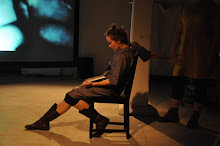My understanding of the philosophical method consists of a line of inquiry introduced to me by Mark Johnston, a Princeton professor, in 2001. To avoid the trap of making assumptions that anything in this world is simply the way it is, we imagine ourselves instead as outside observers coming fresh to the world and finding it strange. Beaming into the upper balconies at the Lyric what, Lord have mercy, would aliens have made of Cav and Pag?
Having off-beat or at least against-the-grain tastes regarding opera (what is avant-garde opera anyway?) I spent the entire concert thinking about aliens instead of opera. What could save Cavelleria rusticana? I imagined each of the singers doubled by massive, larger-than-life helium puppets who wobbled and bobbled behind them, sporting similar hair-dos and mimicking their ground-level melodramas from 20 ft up in the air. The problem is that Italian verismo is inherently funny, or ought to be -- what is realistic opera? -- and when you suppress that fact it's bound to gum up the wheels of production. The Road Runner is irresistible when he races around to Rossini because cartoons resist seriousness by design; refusing to take opera seriously, cartoonishness starts to get at the essence of operaness. Which is another way of saying cartoons are a lot like opera.
Carlo Ventre (Turridu) has all kinds of quintessentially tenorish moments in Cav, flinging his torso around like Darth Vader taking an acting class, and Dolora Zajick weaving in small circles around him like a tugboat... There was one particularly bad/awesome bit of acting in the first act. Dolora is instructed to grab hold of Carlo's jacket (lying on the back of a chair) to prevent his departure, but Carlo/Turridu violently intercepts her hand, precipitating dramatic tension. Instead, what happened was that Dolora made for the jacket, but Carlo missed his cue. Operatic singers aren't hired for their improv skills, and Dolora, unsure what to do, simply froze in an awkward "I'm gonna grab that jacket" position for about 10 seconds till Carlo caught on.
The libretto doesn't help the situation. It's high-stakes from the moment go with everyone hollering about "Traitor!" and "Vendetta!" so there's really nowhere to go.
Mascagni's music is a great example of the fact that opera is the mother of film. Cav is basically a soundtrack. Is it a coincidence that the opening scene of the opera, an extensively choreographed people-bustling-about the town square sort of thing (I love watching singers try to act the "silent" conversation onstage), so resembles the opening sequence of Walt Disney's Beauty and the Beast? This particular scene is also a lot like the complicated goofing off that precedes the entrance of the magician/uncle guy who presents Clara with her Nutcracker doll in the Tchaikovsky ballet. But at least in Beauty and the Beast and The Nutcracker the protagonists are attempting to escape the trauma of the everyday (in Beauty's case, into an less provincial, more individualistic habitus, and for Clara into a genuinely strange and hallucinogenic dreamscape). Saturday night at the Lyric the audience was trying to escape into the play.
Look: I'm a minority. If everyone felt the way I do about operatic staging the Lyric would be dead and gone and the people who donate to the Lyric, if not dead and gone themselves, would have to give their money to, oh, UNICEF. Which, of course, would make the world a better place, but who's paying attention. The huge surprise of the evening was that, made to stay against my will for the second half of the program by David Bashwiner (fellow U-of-C'er and film komponist), Pagliacci was absolutely brilliant, the best bit of comic acting I've ever seen in an operatic production. And, unless I traveled on an alien spaceship Saturday night, it apparently happened at the Lyric Opera of Chicago.
Where and when it was meant to be set was lost on me (and on the singers I interviewed afterward). I'm guessing some kind of fairground/playground on the outskirts of interwar Italy... And I had one flashback to a recent Three Tenors broadcast during Pagliacci's big aria. Otherwise, the Commedia players (the Lyric hired first-rate professional clowns, but the opera people absolutely held their own next to them) in the second act erect a flimsy carnival stage and proceed to entertain the hell out of the townspeople. Frumpy Nedda looks very hot in her Colombina outfit (which includes an enormous blue wig), and I audibly BAAH-HAH'ed when Canio, the creepy old man who woos her, opens his mouth and ends up hemming like a donkey.
If you can get in at intermission, do it.
Subscribe to:
Post Comments (Atom)




No comments:
Post a Comment